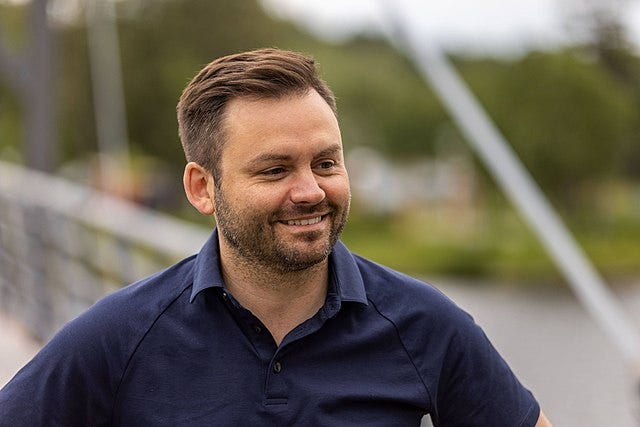Image taken from the Wikimedia commons.
Who are the Parti Quebecois?
No really, who are they?
In the previous election, the PQ had what most of us would call a ‘social democratic platform’. It was obviously left, and was quite radical in certain ways, sometimes more left than even Quebec Solidaire. Wild propositions were floated in their platform– making a unified Quebec public transport and making it one dollar a day for all Quebecois; to ban private healthcare; to stop building highways because of the environmental impact, and much more.
Their least left-leaning policy was that they wanted to limit immigration to 35,000 a year (this is arguably a feature of democratic socialism around the world, considering the number of left leaning governments around the world that have a tendency to be xenophobic), but overall, they emphasised a social democratic view of the province.
That was three years ago, and it’s hard to say what they believe now– the only leftover from that time seems to be that they don’t like immigrants.
Paul St-Pierre Plamondon (PSPP) doesn’t talk much about policy, instead he has two strategies: first, he talks about immigration. This has long been a sticking point with Quebec, and despite the Quebec charter of values losing Pauline Marois the election in 2014, these anti-immigrant feelings are now commonplace around the whole of Canada, Quebec included.
The Second talking point of PSPP are his confrontational videos about current problems in the government. This strategy, of hitting hard and focusing on these wedge issues, has gained support for the party across Quebec.
Alex Boissoneault, the candidate for this by-election in Arthabaska, was recently in a mild controversy. It was uncovered that he had been arrested when he was 24 years old while working with a leftist activist group. In their response, PSPP and Boissoneault repeated over and over that they were “center-right” politicians, and that they were fundamentally conservative.
If they hold to the policies they proposed last election, that would not match up with the idea that they are “centre-right.” History and the present don’t seem to line up or make any sense.
So: Who are the Parti Quebecois?
The first government of René Lévesque was that of a social democratic party, a party that was obviously pro-union, and who tended to nationalize institutions, have higher taxation, and provide services. The second mandate of the PQ was closer to the center, with Lévesque forcing Unions back to work after a long strike during an economic crisis. The challenge with running this party is that it’s only unified on one front; separation. Within the party are those on the left and the right, and bringing them together is always challenging. Their solution might be to have pro-white Quebecer policies that help one demographic, while demonizing another.
“I think they’ll be ethno-nationalist, social welfareism,” Dónal Gill, PhD in Political Science, and assistant professor at Concordia University said. He might be right, but there might be no confirmations about that until the writ drops next year. Even on old PQ staples such as environmentalism, they’ve swung the opposite direction.
Several months ago, Ruba Ghazal and François Legault took PSPP to task over his waffling on the carbon tax.Could PSPP be smelling blood in the water for a more conservative government? Or maybe the right wing of their coalition is winning the ideological debate.
Currently, 338 Canada is predicting the PQ to take a majority in 2026. However, there is no guarantee of that. The Liberal party of Quebec recently elected a new leader, Pablo Rodriguez, and the topwinds seem to be shifting somewhat.
Philippe Fournier, polling analyst and creator of 338 Canada and 125 Quebec, explained that all the polls are showing the same thing. “With Rodriguez, the Liberals take a huge bite out of the CAQ– and the PQ has hit a ceiling,” he said. He explained that the PQ sitting at 32 per cent is enough to win an election when there are five parties all performing fairly well, but you’re not receiving a strong mandate from that.
Philippe Fournier said that regardless of who will win in the next election, it seems that the CAQ might win no seats whatsoever. The internal numbers of the party are the same as Fournier’s. The Liberals are well poised to make waves in Quebec, considering the Federal election that just occurred, and considering that the PQ won’t stop talking about a referendum to separate, which is fairly unpopular at the moment. Most polls indicate that 60 per cent of the province would vote ‘no’ to separation, and 10 per cent are indifferent to the idea. Only somewhere around 30 per cent would vote ‘yes.’
If you were to peruse the Liberal party website, they have made no noise since Rodriguez took power. This makes sense, seeing as the National Assembly isn’t in session until the fall. When the fall rolls around and people see Rodriguez in action, what will happen to voting intentions?
“Rodriguez is a game changer in the short term for the Liberals,” Gill said. “But he has to deliver now.” As much as the fortunes of the Liberal party of Quebec are changing, it would seem that without strong leadership they are in danger of losing momentum. Gill believes that Rodriguez needs to get into the National Assembly, and start throwing punches against the Parti Quebecois.
For now, Quebecers will have to bide their time until next year, and they have the dis/pleasure of watching the CAQ flounder some more.



